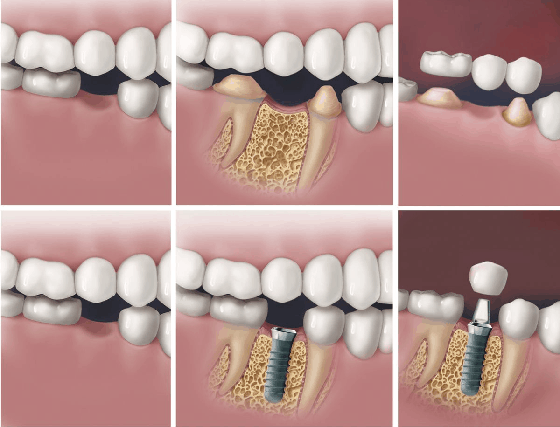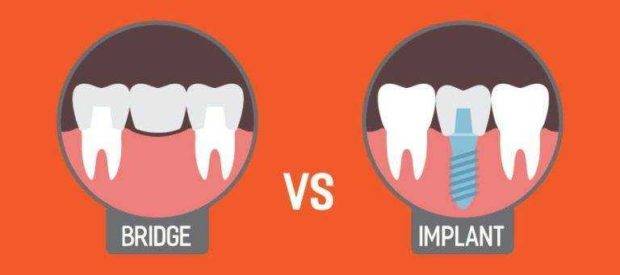Teeth replacements have come a long way in the past years. Missing or lost teeth raise concerns about infection and aesthetic, but the proper replacement is the answer to a confident smile. Today, however, the questions you need to ask your dentist or prosthodontist are a bit different:
What’s the difference between a dental bridge vs. implant? Which treatment option is suitable for me? Very often the dental implant is ideal, but various factors will need to be analyzed first, including if your tooth loss is recent or happened years ago.
Are all these dentistry terms putting you in a fix? You do not need to worry. Sabka Dentist very carefully crafts and lists down the pros and cons, in every aspect, of each type of tooth replacement, that is, of a dental implant as well as a dental bridge.
Practical Reasons for Both
In the olden days a bridge was the only choice, and still involves more than just the missing tooth. The adjacent teeth are required to be “prepped” by removing most of the enamel in order to fabricate the bridge.
With dental implants, however, it is possible to replace just the individual tooth for a result that is stronger and permanent Nonetheless, a dental bridge may be your best option if the neighboring teeth have extensive fillings and need crowns in the future.
And if the tooth or teeth have been lost for a long time, the gum and bone will shrink and procedures beyond the implant are required before placement. The advantages and disadvantages of both procedures can ultimately be discussed with your dentist.
Another very significant point to note down is that dental implants require multiple sessions which involves minor surgery. So, practically speaking, dental implants are not meant for the faint-hearted.
The ones that are afraid of surgeries, needles, and many more complex dental instruments, should stay miles away from this option. Although, it is important to know that just because of the involvement of equipment, does not mean that a dental implant procedure is painful.
Changes in Your Oral Care Routine
Your ability to keep your mouth hygiene will be easier with an implant. Dental bridges have cemented the mouth, and involve at least three crowns connected together to fill the space of the missing tooth.
This pattern creates challenges when brushing and flossing, so extra oral hygiene instruction and home care are crucial. When flossing, in particular, an extra step is needed to thread the floss under the artificial tooth. In contrast, implants can restore teeth individually without affecting other teeth.
Making oral care more successful. You can brush and floss effectively around an implant just like your natural tooth.

Durability
Durability highly depends upon how you look after the artificial fixative. Dental implants are more durable than bridges, allowing them to provide protection that lasts a lifetime. The implant’s metal cylinder is normally made of titanium, according to the American Academy of Implant Dentistry (AAID), and this material fuses with the jawbone effectively.
It’s made of a strong metal, they are very resistant to decay and gum problems. On the other hand, the average life of a dental bridge is approximately 10 years. A portion of your original tooth remains beneath it and normal wear may cause the bridge to fail more easily over time. In general, the remaining part of the tooth structure continues to be susceptible to decay.
Aesthetics
What about aesthetics?
Often the implant will provide the most desired result, as your dentist can make the final tooth look just like your natural enamel. Sometimes, an implant can be placed immediately after tooth extraction, protecting the natural level of bone and improving the final appearance of the dental work.
Dental Bridge vs. Implant Cost
The cost of the dental bridge is initially less expensive, but it may need to be replaced at some point in the future. Implants – from preparation to final placement – may look more expensive, but over time can be more cost-effective. In addition, the implant can be more flexible, allowing patients to budget the cost in increments.
After extraction, for example, a bone graft is sometimes required. This graft normally has to heal for several months before implant placement, at which point it can take anywhere from three to six months before the process is complete.
So, team implants or bridges?
Carefully read through each advantage and disadvantage and make your choice. Do not focus only on the financial restrictions, but also focus on each one’s durability, time consumption for the procedure, outcome, and lastly, your comfort.
Make this decision after consulting with your dentist. He or she knows your mouth best and has the tools and knowledge to guide you through what’s best for it.
Dr. Manan Dhulia Dental Director of Sabka dentist says “Irrespective of each one’s pros and cons, dental implants and bridges both have come a long way, and are the most selected choice for most individuals who are looking for a tooth replacement.”
Dr. Preethi Nagarajan Dental Director of Sabka dentist says “Implants perform like a natural tooth, and it does not affect the nearby teeth”.











4 thoughts on “Dental Implants vs Bridges: How to Know What’s Best for You”
Very informative .do you have a branch in Ahmedabad.
yes i guess they have a branc in ahmedabad. You can call on 9222233111 to book your appointment
well written.
i had a brige implant, not helpfull on that , so can i start implant on the same place